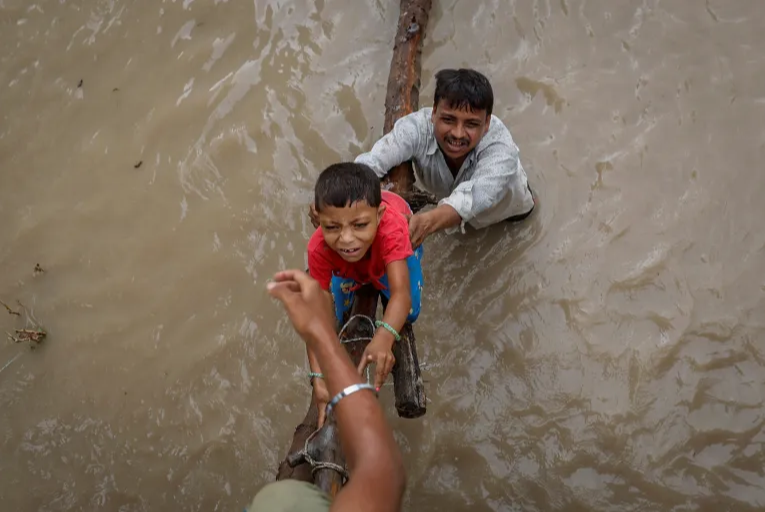
A man helps his son to climb onto a flyover under construction after being displaced by the rising water level of the Yamuna river in New Delhi [Adnan Abidi/Reuters]
New Delhi, July 14 (RHC)-- Supplies of drinking water in New Delhi will fall by a quarter on Thursday and Friday because three treatment plants have been flooded, the city government said, as the Yamuna river overflows after incessant rain.
The river that flows through the city of 20 million residents is at its highest level in 45 years after unusually heavy downpours in neighbouring states like Haryana to the north.
The city also saw heavy rain over the weekend with flooding in low-lying areas that forced hundreds of people to seek shelter in relief camps.
“There will be a water problem in some areas of Delhi,” the city’s chief minister, Arvind Kejriwal, said on Twitter. “As soon as the Yamuna water recedes, we will try to start them as soon as possible,” he said of the three water treatment plants. Kejriwal said the water level in the river could peak later on Thursday and in the meantime, people were being evacuated from flooded areas.
“Saving the lives of people is most important. I appeal to all the people of Delhi to cooperate with each other in every possible way in this emergency,” he told reporters.
Northern Indian states near New Delhi had received record rainfall since the monsoon began on June 1, with Punjab and Himachal Pradesh recording 100 percent and 70 percent more rain than average, respectively, the India Meteorological Department said. New Delhi recorded 112 percent above-average rainfall, the department said.
Flood barriers have been set up in the posh Civil Lines residential area, where some top officials, including Kejriwal, live in a bid to block the surging river water.
Meanwhile, at least 88 people have died in the northern Himachal Pradesh state since the rains began on June 24, India’s ANI news agency reported. Flash floods in the state over the weekend brought down a bridge and washed away several clusters of residential huts.
Rescue teams were mobilised to assist 40 foreign travellers – including 14 Russians and 12 Malaysians – stranded at tourist destinations alongside several hundred Indian nationals, state police chief Satwant Atwal told AFP news agency.
At least 12 people were killed in neighbouring Uttarakhand state, including nine on Tuesday when debris fell on their vehicles on a national highway, officials said. A popular pilgrimage to the state’s Kedarnath temple, home to a revered shrine of the Hindu deity Shiva, was suspended due to heavy rains.
Incessant rain had caused significant damage across Punjab state, with at least 10 people killed in flash floods. In Uttar Pradesh, India’s most populous state, at least 11 have died in rain-related incidents, according to state officials.
The monsoon brings South Asia about 80 percent of its annual rainfall and is vital for agriculture and the livelihoods of millions of farmers.
But it brings destruction every year in the form of landslides and floods. Melting glaciers add to the volume of water while unregulated construction in flood-prone areas exacerbates the damage.
The rainfall is hard to forecast and varies considerably, but scientists say climate change is making the monsoon stronger and more erratic.

